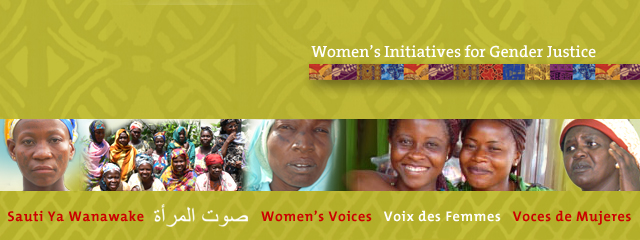|
|
||
|
||
 |
||
December 2012 |
||||
Welcome to the |
||||
|
||||

The Women's Initiatives for Gender Justice is an international women's human rights organisation that advocates for gender justice through the International Criminal Court (ICC) and through domestic mechanisms, including peace negotiations and justice processes. We work with women most affected by the conflict situations under investigation by the ICC. The Women's Initiatives for Gender Justice works in Uganda, the Democratic Republic of the Congo, Sudan, the Central African Republic, Kenya, Libya and Kyrgyzstan. Offices 
|
Dear Friends,Welcome to the December 2012 issue of Women's Voices, our regular eLetter from the Women's Initiatives for Gender Justice. In Women's Voices, we provide updates and analysis on political developments, the pursuit of justice and accountability, the participation of women in peace talks and reconciliation efforts from the perspective of women's rights activists within armed conflict situations, specifically those countries with Situations under investigation by the International Criminal Court (ICC) including Uganda, the Democratic Republic of the Congo (DRC), Darfur, the Central African Republic (CAR), Kenya, Libya and Côte d'Ivoire. In addition to Women's Voices, we also produce a regular legal eLetter, Legal Eye on the ICC, with summaries and gender analysis of judicial decisions and other legal developments at the International Criminal Court (ICC), and discussion of legal issues arising from victims' participation before the Court, particularly as these issues relate to the prosecution of gender-based crimes in each of the Situations under investigation by the ICC. More information about the work of the Women's Initiatives for Gender Justice and previous issues of Women's Voices and Legal Eye on the ICC can be found on our website www.iccwomen.org. This is a special edition of Women’s Voices in response to the current security crisis in eastern DRC, the reports of gender-based and other crimes and the revelation by the United Nations of the international forces involved in the ongoing conflicts in the country. From all of us at the Women’s Initiatives we wish you a Merry Christmas, happy holidays and a peaceful new year. Conflict in the eastern DRCOn 15 November, armed conflict broke out between the M23 and the Congolese Army (FARDC).[1] The security situation in the eastern DRC has declined significantly during 2012 particularly following the defection of ICC indictee Bosco Ntaganda and other former members of the Congrès national pour la défense du peuple (CNDP) from the Congolese Army in April, to form a new rebel group, the Mouvement du 23 Mars (M23). On 19 November partners of the Women’s Initiatives for Gender Justice based in Goma reported gunfire and bombs starting at around 3pm, following which almost all means of transportation were shut down and eventually most of the border crossings between Rwanda and the DRC were closed. On 20 November, the M23 successfully captured the city of Goma. The Congolese Army ceded the area with reportedly limited resistance. According to local women’s rights advocates, the provincial authorities fled without making a statement to the population regarding safety or security measures. With the retreat of the Army, MONUSCO, the UN stabilisation mission in the DRC, which had been working alongside the FARDC to resist the M23 occupation of Goma, also departed from the city. On 20 and 21 November, angered by the failure of the authorities to protect civilians in Goma, protesters in Kisangani and Bukavu set property owned by the government and MONUSCO on fire. Partners in Kisangani reported that vehicles belonging to MONUSCO and the Office National des Transports (ONATRA) were set on fire, as well as offices belonging to the DRC’s Independent National Electoral Commission (CENI), residences belonging to the Municipality of Kisangani, and the Court of Peace. Police could not control the protesters, and several people were killed when the police tried to break up the protest. Similarly, protesters in both Bukavu and Kisangani destroyed the provincial headquarters of President Joseph Kabila’s People’s Party for Reconstruction and Democracy (PPRD). In Bukavu, tires were burned in the streets and police and military fired live ammunition to disperse the crowds. On 1 December, M23 rebels officially retreated to positions 20 kilometres from the city, pursuant to an agreement between the DRC Government and the rebel group following talks convened by President Museveni of Uganda, under the auspice of the International Conference on the Great Lakes Region (ICGLR).[2] However, current reports indicate that some members of M23 have remained in Goma, disguised in civilian clothing.[3] On 14 December, local women’s rights organisations reported that the M23 had re-established positions six kilometres from the city limits.[4] Negotiations between the M23 and the Congolese Government are ongoing, but Sultani Makenga, who in October 2012 was promoted to Brigadier General of M23’s armed wing, has indicated that M23 will ‘finish what it started’ if discussions fail.[5] Our partners in the region report that safety conditions in the province remain precarious and tensions are high. ■ Read the blog post on the recent events in the eastern DRC by the Executive Director of the Women’s Initiatives for Gender Justice, Brigid Inder, which was featured on the UK Foreign and Commonwealth Office website 7 December 2012. ■ Read the ‘Report Summarizing Human Rights Violations Committed by M23 in North-Kivu,’ by the Réseau National des ONGs des Droits de l'Homme de la République Démocratique du Congo (RENADHOC), along with our partial translation and summary, released on 4 December 2012 which provides an account of crimes allegedly committed by M23 in the period up to and during its recent occupation of Goma. ■ Read ‘Members of the CNP suppress a peaceful protest in Bukavu, South Kivu, against the taking of Goma by M23,’ statement issued by the Bukavu-based Congolese Initiatives for Justice and Peace (ICJP), released on 21 November 2012. ■ For more background on the M23, including the role of ICC indictee Bosco Ntaganda in the rebel movement, read the Gender Report Card on the ICC 2012 (p 173-178). ■ Read more information about the ICC arrest warrant for Bosco Ntaganda. The Goma Peace AgreementsThe M23 is named in reference to peace agreements signed in Goma on 23 March 2009, which absorbed members of the CNDP into the Congolese Army. Immediately after the Goma Agreements were signed, the Women’s Initiatives for Gender Justice expressed concern to the Secretary-General of the United Nations about specific aspects of the agreement, including the lack of a vetting mechanism for combatants prior to their integration into the Army and national police force, the absence of provisions in the Agreement requiring formal retraining of combatants, and the ambiguity of the provisions for amnesty.[6] These concerns were conveyed to the UN Secretary-General in June 2009, in an open letter from the Women’s Initiatives, signed by 65 partners in the eastern DRC, representing over 180 local women’s and human rights organisations.[7] ■ For the Women’s Initiatives analysis of the Goma Peace Agreements (2009), read In Pursuit of Peace (p 9 – 23); Women’s Voices May 2009; Women’s Voices July 2009; and Women’s Voices December 2009. The United Nations Group of Experts on the DRCIn reports submitted to the United Nations Security Council in June[8] and November 2012,[9] the United Nations Group of Experts on the DRC (GoE) expressed concern over the deteriorating security situation in the DRC, noting that an increased presence of troops in the eastern DRC and the delivery of significant quantities of military supplies appeared to indicate that the M23 was preparing for large-scale military operations. According to the GoE, the Government of Rwanda and, to a lesser extent, the Government of Uganda, have provided military and political support to M23, including by transporting weapons and soldiers through Rwandan territory; recruiting Rwandan and Congolese refugees for M23; providing weapons and ammunitions to M23; deploying the Rwandan Defence Force (RDF) and the Ugandan People’s Defence Force (UPDF) to reinforce M23 units on the battlefield against the Congolese Army; and encouraging and facilitating desertions from the Congolese Army. More recently, a leaked document authored by the Coordinator of the GoE and dated 26 November indicates that in the days leading up to the attack on Goma, as M23 progressed towards the capital, members of the RDF crossed the Rwandan-DRC border to conduct operations against the Congolese Army.[10] ■ Read the GoE’s Addendum to the Interim Report of the Group of Experts on the Democratic Republic of the Congo, released 27 June 2012. ■ Read the GoE’s Interim Report of the Group of Experts on the Democratic Republic of the Congo, released 15 November 2012. ■ Read a letter authored by the Coordinator of the Group of Experts on the Democratic Republic of the Congo and leaked to the public, dated 26 November 2012. Sexual violence and international human rights violationsPartners based in Goma have reported the displacement of thousands of civilians, abductions, killings, deaths, and rapes, perpetrated by both the M23 and the Congolese Army. Preliminary reports from MONUSCO indicate that the Congolese Army committed rapes and other forms of sexual violence when they retreated from Goma on 20 November 2012.[11] Likewise, in a statement issued shortly after the occupation of Goma, the United Nations High Commissioner for Human Rights indicated that she was ‘deeply concerned’ about the deteriorating situation in the eastern DRC, noting that advances made by the M23 had corresponded with ‘a significant number of violations of human rights and international humanitarian law committed against civilians, particularly those fleeing the combat zones. These violations include the wounding and abduction of civilians (including women and children), the looting and destruction of properties, and threats to journalists’.[12] In both its June and November reports, the GoE concluded that rates of sexual violence in the eastern DRC have increased since the emergence of M23 and the intensification of conflict in the region. During the first six months of 2012, the UN Population Fund recorded 742 cases of sexual violence perpetrated by armed groups in North Kivu, and 955 similar cases in South Kivu. According to information obtained by the GoE, widespread rapes have been committed by M23, Raia Mutomboki, Mai Mai Morgan, and the FDLR. By the end of September, the UN and other international human rights non-government organisations had documented 46 rapes committed by M23.[13] |
|
Footnotes1 Integrated Regional Information Networks (IRIN), Democratic Republic of Congo's M23 rebellion under pressure, 16 November 2012, available at: <http://www.unhcr.org/refworld/docid/50bf13032.html>. |
|
|||||||||||||||||||||||
